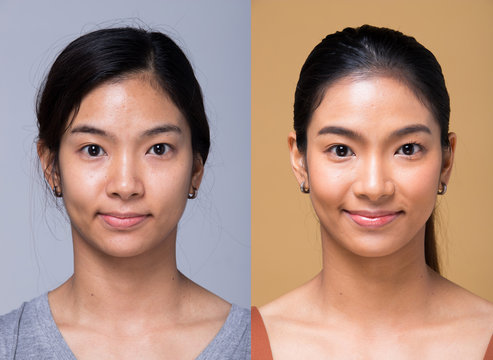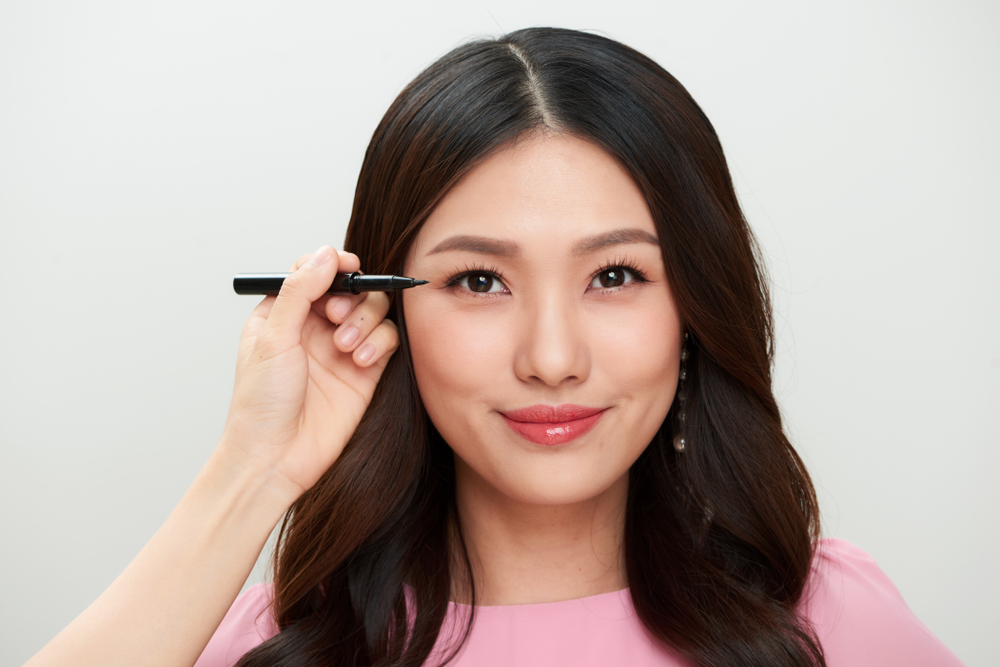The Beauty Spectrum: Exploring Makeup and No Makeup Choices for Asian Women
Related Articles: The Beauty Spectrum: Exploring Makeup and No Makeup Choices for Asian Women
Introduction
In this auspicious occasion, we are delighted to delve into the intriguing topic related to The Beauty Spectrum: Exploring Makeup and No Makeup Choices for Asian Women. Let’s weave interesting information and offer fresh perspectives to the readers.
Table of Content
The Beauty Spectrum: Exploring Makeup and No Makeup Choices for Asian Women

The world of beauty is a vast and diverse landscape, with each individual navigating their own unique path. For Asian women, the choice between makeup and no makeup is often imbued with cultural, societal, and personal significance. This exploration delves into the complexities of this decision, examining the motivations, perceptions, and evolving trends surrounding both choices.
The Influence of Culture and Society
Historically, makeup has played a significant role in Asian cultures, often signifying social status, ritual practices, and artistic expression. From the elaborate geishas of Japan to the traditional Korean makeup of the Joseon Dynasty, beauty standards and techniques have evolved over centuries, leaving a lasting imprint on contemporary aesthetics.
Modern society, however, presents a more complex landscape. The rise of social media and the constant bombardment of images contribute to a heightened awareness of beauty standards, often perpetuating unrealistic ideals. This pressure can influence Asian women’s choices regarding makeup, leading to feelings of inadequacy or the desire to conform to perceived norms.
The Power of Individuality
Despite these external pressures, a growing movement champions the power of individuality and self-acceptance. Many Asian women are choosing to embrace their natural features, challenging traditional beauty standards and celebrating the diversity of their appearance. This shift reflects a growing awareness of the importance of self-love and the rejection of narrow definitions of beauty.
The Role of Makeup: Enhancement and Expression
For those who choose to wear makeup, it serves a multitude of purposes. It can be a tool for enhancing natural features, creating a desired look, or simply expressing creativity. Makeup allows individuals to experiment with different styles, colors, and textures, ultimately empowering them to feel confident and beautiful in their own skin.
Furthermore, makeup can be a powerful form of self-expression, allowing individuals to communicate their personality, mood, and cultural identity. It can be a way to celebrate special occasions, express artistic flair, or simply enhance one’s everyday look.
The Beauty of Natural Features
Choosing to go makeup-free is equally valid and empowering. It allows individuals to embrace their natural features, celebrate their unique beauty, and challenge societal expectations. This choice often reflects a commitment to self-acceptance and a rejection of the pressure to conform to unrealistic beauty standards.
Going makeup-free can also be a statement of self-confidence and a rejection of the perceived need to hide or alter one’s natural appearance. It empowers individuals to feel comfortable and confident in their own skin, regardless of societal norms.
Navigating the Spectrum: A Personal Journey
Ultimately, the decision to wear makeup or go makeup-free is a personal one. There is no right or wrong answer, and the most important factor is feeling confident and comfortable in one’s own skin. The beauty of the makeup vs. no makeup debate lies in its ability to spark conversations about individuality, self-acceptance, and the evolving definitions of beauty.
FAQs: Makeup vs. No Makeup for Asian Women
Q: Does wearing makeup make me less Asian?
A: The choice to wear makeup or not does not diminish one’s Asian identity. It is a personal choice that reflects individual preferences and cultural influences.
Q: Are there specific makeup trends for Asian women?
A: While there are general makeup trends, Asian women have unique features and preferences that influence their makeup choices. Exploring different styles and techniques can help find what works best for individual features.
Q: Is it okay to wear makeup to enhance my features?
A: Makeup can be used to enhance natural features, but it’s important to remember that true beauty comes from within. Focusing on self-acceptance and embracing one’s natural features is crucial.
Q: Is it better to go makeup-free?
A: Both choices are valid and empowering. The decision to wear makeup or not should be based on personal preference and comfort.
Q: How can I feel confident with or without makeup?
A: Building self-confidence comes from within. Practicing self-love, embracing one’s unique features, and focusing on personal values can contribute to a positive self-image.
Tips for Navigating the Makeup vs. No Makeup Choice
- Embrace Experimentation: Explore different makeup styles and techniques to find what makes you feel confident and comfortable.
- Prioritize Skin Care: A healthy skincare routine can enhance natural beauty and minimize the need for heavy makeup.
- Focus on Self-Acceptance: Challenge societal beauty standards and embrace your unique features.
- Celebrate Individuality: Express your personality and cultural identity through makeup or by embracing your natural beauty.
- Remember Your Why: Reflect on the reasons behind your makeup choices and ensure they align with your values and sense of self.
Conclusion: Embracing the Spectrum of Beauty
The makeup vs. no makeup debate for Asian women is ultimately a journey of self-discovery and empowerment. It’s about embracing individuality, challenging societal expectations, and celebrating the diverse spectrum of beauty. Whether you choose to enhance your features with makeup or embrace your natural beauty, the most important thing is to feel confident and comfortable in your own skin.








Closure
Thus, we hope this article has provided valuable insights into The Beauty Spectrum: Exploring Makeup and No Makeup Choices for Asian Women. We appreciate your attention to our article. See you in our next article!
